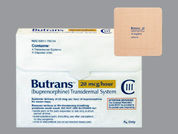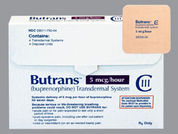Butrans
Butrans generic name: Buprenorphine
What is Butrans used for?
This medication is used to help relieve severe ongoing pain (such as due to arthritis, chronic back pain). Buprenorphine belongs to a class of drugs known as opioid analgesics. It works in the brain to change how your body feels and responds to pain. The higher strengths of this drug (7.5, 10, 15, or 20 micrograms per hour patches) should be used only if you have been regularly taking moderate amounts of opioid pain medication. These strengths may cause overdose (even death) if used by a person who has not been regularly taking opioids. Do not use this medication to relieve pain that is mild or that will go away in a few days. This medication is not for occasional ("as needed") use.
CHEMICAL NAME
DRUG TYPE
Butrans Prices
Searching for the lowest prices
Butrans Frequently Asked Questions
Before using buprenorphine, tell your doctor or pharmacist if you are allergic to it; or to adhesives; or if you have any other allergies. This product may contain inactive ingredients, which can cause allergic reactions or other problems. Talk to your pharmacist for more details.
Before using this medication, tell your doctor or pharmacist your medical history, especially of: brain disorders (such as head injury, tumor, seizures), breathing problems (such as asthma, sleep apnea, chronic obstructive pulmonary disease-COPD), kidney disease, liver disease, mental/mood disorders (such as confusion, depression), personal or family history of a substance use disorder (such as overuse of or addiction to drugs/alcohol), stomach/intestinal problems (such as blockage, constipation, diarrhea due to infection, paralytic ileus), difficulty urinating (such as due to enlarged prostate), disease of the pancreas (pancreatitis), gallbladder disease.
Buprenorphine may cause a condition that affects the heart rhythm (QT prolongation). QT prolongation can rarely cause serious (rarely fatal) fast/irregular heartbeat and other symptoms (such as severe dizziness, fainting) that need medical attention right away.
The risk of QT prolongation may be increased if you have certain medical conditions or are taking other drugs that may cause QT prolongation. Before using buprenorphine, tell your doctor or pharmacist of all the drugs you take and if you have any of the following conditions: certain heart problems (heart failure, slow heartbeat, QT prolongation in the EKG), family history of certain heart problems (QT prolongation in the EKG, sudden cardiac death).
Low levels of potassium or magnesium in the blood may also increase your risk of QT prolongation. This risk may increase if you use certain drugs (such as diuretics/"water pills") or if you have conditions such as severe sweating, diarrhea, or vomiting. Talk to your doctor about using buprenorphine safely.
This drug may make you dizzy or drowsy. Alcohol or marijuana (cannabis) can make you more dizzy or drowsy. Do not drive, use machinery, or do anything that needs alertness until you can do it safely. Avoid alcoholic beverages. Talk to your doctor if you are using marijuana (cannabis).
Raising your skin/body temperature may cause overdose. Avoid increasing your skin temperature at or near the application site (for example, using products such as heating pads, electric blankets, hot tubs, heat or tanning lamps). Avoid taking hot baths and sunbathing. Tell your doctor promptly if you develop a fever.
If you are going to have an MRI test, tell testing personnel that you are using this patch. Some patches may contain metals that can cause serious burns during an MRI. Ask your doctor whether you will need to remove your patch before the test and apply a new patch afterward, and how to do so properly.
Before having surgery, tell your doctor or dentist about all the products you use (including prescription drugs, nonprescription drugs, and herbal products).
Older adults may be more sensitive to the effects of this drug, especially confusion, dizziness, drowsiness, slow/shallow breathing, and QT prolongation (see above).
During pregnancy, this medication should be used only when clearly needed. It may harm an unborn baby. Discuss the risks and benefits with your doctor. (See also Warning section.)
This drug passes into breast milk and may have undesirable effects on a nursing infant. Tell the doctor right away if your baby develops unusual sleepiness, difficulty feeding, or trouble breathing. Consult your doctor before breastfeeding.


